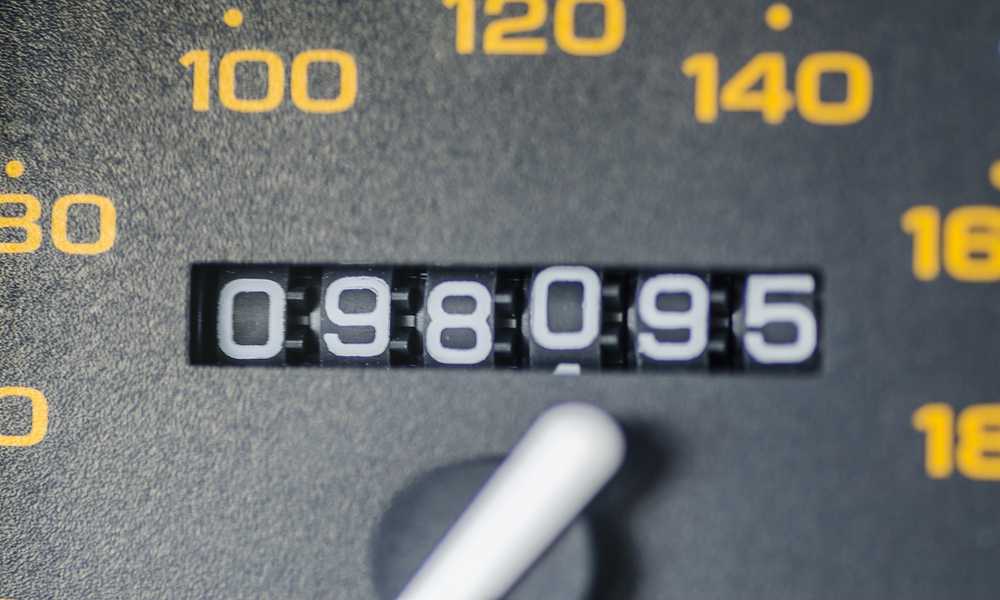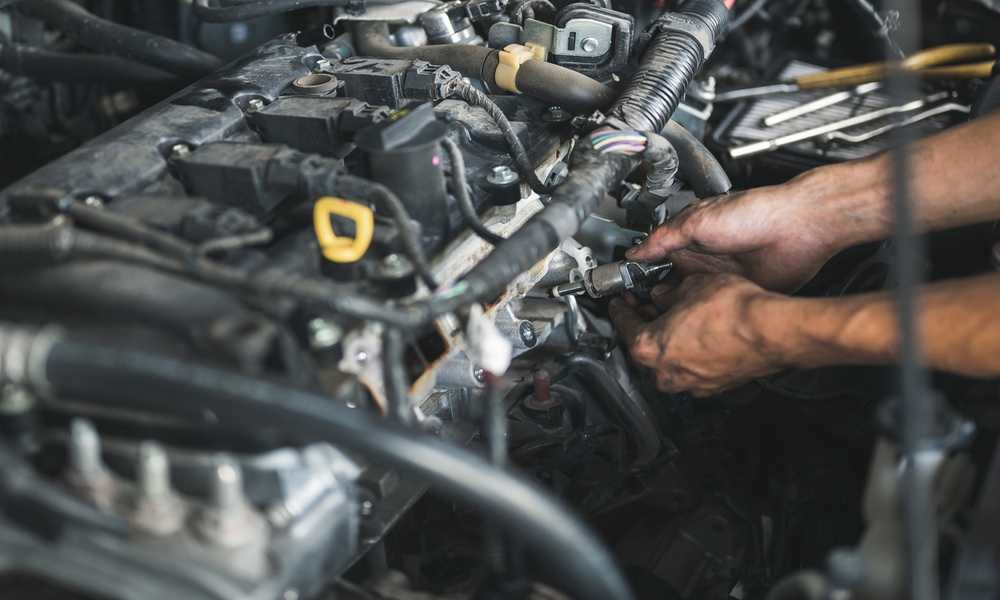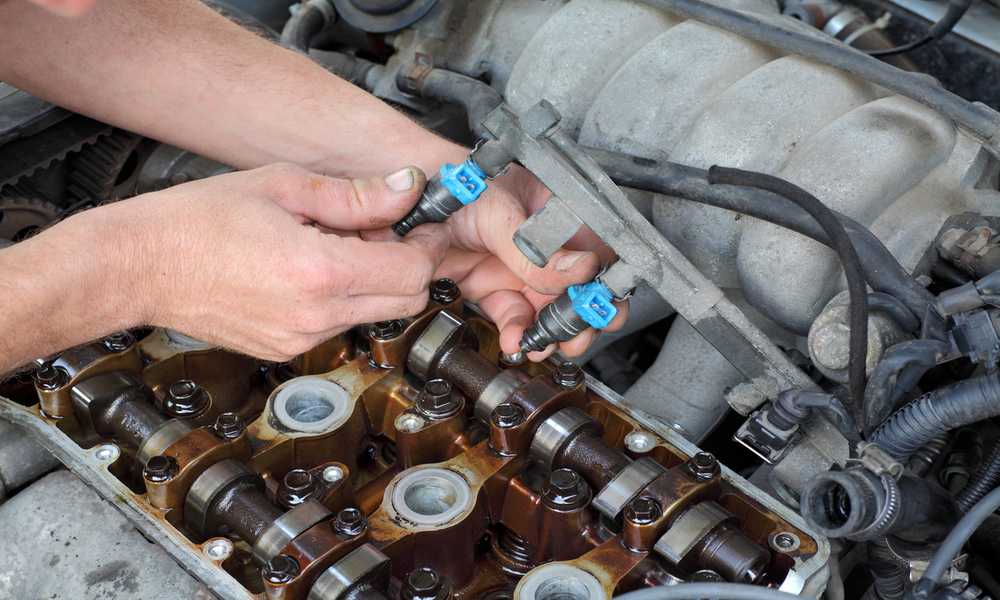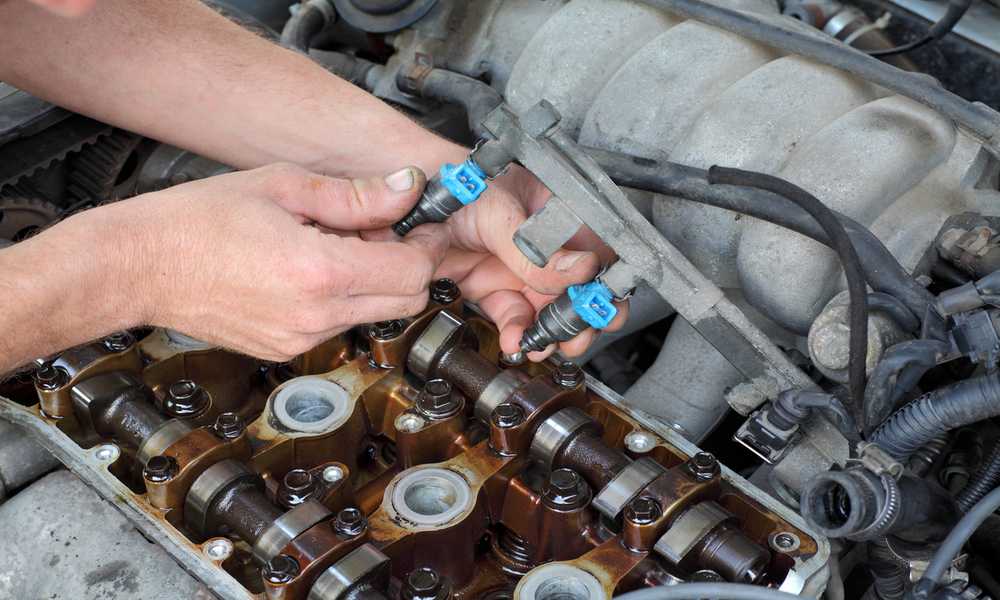Fuel injectors play a vital role in the performance and efficiency of our vehicles. They deliver precise amounts of fuel to the engine, ensuring optimal combustion and power. But like any other component, fuel injectors can wear out over time, leading to decreased performance and potential engine problems. So, when should you replace your fuel injectors? In this blog post, we will explore everything you need to know about when to replace fuel injectors and help you determine if it’s time to give your engine a much-needed boost! Whether you’re a car enthusiast or just looking for some expert advice, keep reading as we dive into the world of fuel injectors and discover how they impact your vehicle’s overall performance.
Is it time to replace fuel injectors?
Is it time to replace fuel injectors? This is a common question that many car owners find themselves asking. The answer depends on various factors, including the age and mileage of your vehicle, as well as any symptoms you may be experiencing.
One indication that it might be time to replace your fuel injectors is if you notice a decrease in engine performance. If your car is struggling to accelerate or experiencing misfires, it could be a sign of clogged or faulty injectors. Additionally, if you’re noticing decreased fuel efficiency or an increase in exhaust emissions, this could also point to issues with the injectors.
Another factor to consider is the maintenance history of your vehicle. If you’ve been diligent about regular maintenance and have had your fuel system cleaned periodically, it may extend the lifespan of your injectors. However, if neglect has occurred and contaminants have built up over time, replacement may become necessary.
Consulting with a qualified mechanic is crucial when determining whether it’s time for new injectors. They can perform diagnostic tests and inspect the condition of your current ones to provide an accurate assessment.
Remember that addressing fuel injector problems promptly can prevent further damage and costly repairs down the line. So don’t delay – keep an eye out for any signs indicating potential issues with your fuel injectors!
Are fuel injectors worth replacing?
Are fuel injectors worth replacing? This is a question many car owners ask themselves when faced with the decision of whether or not to replace their fuel injectors. The answer depends on several factors, including the age and condition of your vehicle, as well as your driving habits.
Fuel injectors play a crucial role in delivering fuel to your engine efficiently and effectively. Over time, they can become clogged or worn out, resulting in decreased performance and fuel economy. If you notice symptoms such as rough idling, poor acceleration, or increased fuel consumption, it may be time to consider replacing your fuel injectors.
Replacing fuel injectors can improve engine performance and restore optimal fuel efficiency. Newer models of vehicles often have more advanced injector technology that can provide better atomization and distribution of fuel. This can result in smoother running engines and improved overall performance.
The decision to replace your fuel injectors should be based on the specific needs of your vehicle. Consulting with a trusted mechanic who specializes in automotive diagnostics can help you determine if replacement is necessary for optimal performance.
Remember that preventive maintenance is key to keeping your vehicle running smoothly for years to come. Regularly inspecting and cleaning your fuel injectors can help prolong their lifespan and prevent costly repairs down the road.
While it may not always be necessary to replace every single injector at once unless there are multiple issues present; individual replacement is also an option depending on circumstances determined by professional diagnosis.
How do I know if my fuel injectors need replacing?
How do you know if your fuel injectors need replacing? Well, there are a few signs that can indicate it’s time for a replacement. If you notice a decrease in engine performance or a drop in fuel efficiency, it could be due to clogged or malfunctioning injectors. Similarly, if your vehicle is experiencing rough idling or stalling issues, this could also be linked to faulty injectors.
Another indicator is the presence of black smoke coming from the exhaust pipe. This can suggest that the injectors are not delivering fuel properly and causing an imbalance in the air-fuel mixture. Additionally, if you’re encountering difficulty starting your car or experiencing misfires during acceleration, these symptoms may point towards failing fuel injectors.
It’s important to note that these signs can also be caused by other problems within the engine system. To determine whether your fuel injectors specifically require replacement, it’s recommended to have them inspected by a professional mechanic who can perform diagnostic tests using specialized equipment.
Remember, regular maintenance and cleaning of your fuel injectors can help prolong their lifespan and prevent potential issues down the line. So stay vigilant and address any concerns promptly to ensure optimal engine performance!
When to replace fuel injectors?

It’s a question many car owners ask, and the answer depends on several factors. One of the main factors is the type of fuel injector you have. Older vehicles with traditional port fuel injectors may require replacement every 50,000 to 100,000 miles. On the other hand, newer vehicles with direct fuel injection systems may not need replacement until they reach 150,000 to 200,000 miles.
Another factor to consider is how well you maintain your vehicle. Regularly scheduled maintenance can help prolong the life of your fuel injectors. Cleaning them periodically can prevent buildup and keep them functioning optimally for longer periods.
Additionally, pay attention to any symptoms that could indicate a problem with your fuel injectors. If you notice decreased engine performance, poor gas mileage, or rough idling, it may be time to have your injectors inspected and possibly replaced.
There isn’t a one-size-fits-all answer when it comes to replacing fuel injectors. The best course of action is to follow your vehicle manufacturer’s recommendations and consult with a trusted mechanic who can assess the condition of your specific injectors.
Is replacing fuel injectors necessary?
When it comes to the question of whether or not replacing fuel injectors is necessary, the answer isn’t always cut and dry. Fuel injectors play a crucial role in delivering the right amount of fuel to your engine, so if they become clogged or malfunctioning, it can lead to a variety of issues.
One common symptom of faulty fuel injectors is poor engine performance. If you notice that your vehicle’s acceleration has become sluggish or if it idles roughly, it could be a sign that your fuel injectors are in need of replacement.
Another indication that replacement may be necessary is an increase in fuel consumption. When fuel injectors aren’t functioning properly, they may not be able to deliver the correct amount of fuel to the engine, causing it to burn more than necessary.
In some cases, failing fuel injectors can even lead to misfires or stalling. These issues can be dangerous and should not be ignored.
While regular maintenance and cleaning can help prolong the life of your fuel injectors, there may come a time when replacement becomes inevitable. It’s best to consult with a professional mechanic who can assess the condition of your injector system and determine if replacement is necessary for optimal performance and efficiency.
Remember, addressing any potential issues with your vehicle’s components early on will save you from costly repairs down the line. So pay attention to how your car performs and don’t hesitate to take action when needed!
Are fuel injectors replacing making a difference?
Fuel injectors play a crucial role in the functioning of our vehicles’ engines. They are responsible for delivering the precise amount of fuel into the combustion chamber, ensuring efficient and optimal performance. Over time, however, these injectors can become clogged or worn out, affecting their ability to deliver fuel accurately.
Replacing faulty fuel injectors can make a significant difference in your vehicle’s performance. When fuel injectors are not functioning properly, you may experience issues such as decreased power, rough idling, poor acceleration, and even engine misfires. By replacing damaged or malfunctioning injectors with new ones that are clean and well-functioning, you can restore your engine’s efficiency and improve its overall performance.
It is worth noting that simply cleaning dirty fuel injectors may not always be sufficient to address underlying problems. In some cases, replacement might be necessary to ensure long-term reliability and prevent further damage to your engine.
While it may seem tempting to only replace the injector that is causing issues when one goes bad (and this approach might work in certain situations), it is generally recommended to replace all of them at once. This ensures uniformity among all the components and reduces the risk of future injector failures.
When considering whether or not to replace your fuel injectors, it is important to factor in cost as well. The price for replacing fuel injectors can vary depending on factors such as vehicle make/model and labor costs associated with installation. It is advisable to consult with a professional mechanic who can provide an accurate estimate specific to your situation.
In conclusion (oops!), if you’re experiencing symptoms of bad fuel injectors or noticing a decrease in your vehicle’s performance, it may be time consider replacing them. Newer and properly functioning fuel injectors will help optimize engine efficiency while improving overall power output – making a noticeable difference in how your car runs on the road!
If one fuel injector is bad should i replace them all?
If you suspect that one of your fuel injectors is bad, you might be wondering if it’s necessary to replace all of them. The answer depends on a few factors. First, consider the age and mileage of your vehicle. If your car is relatively new or has low mileage, it might not be necessary to replace all the fuel injectors. However, if your vehicle is older or has high mileage, there’s a greater chance that the other injectors could also be nearing the end of their lifespan.
Next, think about how the fuel injector became damaged in the first place. If it was due to a specific issue like contamination or clogging, then replacing only the faulty injector should suffice. However, if there was a more systemic problem causing the damage (such as poor fuel quality), it might be wise to replace all of them to prevent future issues.
Consider cost and convenience. Replacing multiple fuel injectors can be expensive and time-consuming. If budget constraints are an issue or if you’re unable to handle extensive repairs at once, replacing only the faulty injector may be a more practical solution. Determining whether to replace all fuel injectors when one goes bad requires careful consideration of multiple factors including vehicle age and condition, cause of failure, and personal circumstances.
Is it better to replace all fuel injectors?

Is it better to replace all fuel injectors? This is a common question that many car owners ask when faced with issues related to their fuel injectors. The answer depends on several factors.
If one injector has failed or is causing problems, it may be tempting to simply replace that particular injector. However, it’s important to consider the age and condition of the other injectors. If they are old or showing signs of wear and tear, replacing them all might be a wise decision.
Replacing all the fuel injectors at once ensures that you have a set of new and properly functioning injectors in your engine. This can help improve your vehicle’s overall performance and fuel efficiency. It also reduces the risk of future injector failures down the line.
Furthermore, replacing all the injectors can provide peace of mind knowing that you won’t have to deal with individual injector issues in the near future. It saves time and money by preventing multiple trips to the mechanic for separate replacements.
However, there are instances where replacing only one or a few faulty injectors may suffice. For example, if your vehicle is relatively new and well-maintained, it’s possible that only one or two injectors need attention while others remain in good working condition.
In conclusion (not concluding), whether you choose to replace all fuel injectors or just those causing trouble ultimately depends on your specific situation – age of the car, maintenance history, budget considerations – as well as advice from a trusted mechanic who can assess their condition accurately
How much should it cost to replace fuel injectors?
When it comes to the cost of replacing fuel injectors, there are a few factors that can influence the overall price. The first factor is the make and model of your vehicle. Different cars may have different types of fuel injectors, which can vary in price. Additionally, the number of fuel injectors that need to be replaced will also impact the cost.
Another factor to consider is whether you choose to go with OEM (original equipment manufacturer) or aftermarket fuel injectors. OEM injectors are typically more expensive but may offer better quality and reliability. On the other hand, aftermarket options can be more affordable but may not perform as well.
Labor costs are another consideration when calculating the total expense. Depending on where you take your car for repairs, labor rates can vary significantly.
It’s difficult to provide an exact cost without knowing specific details about your vehicle and location. However, it’s important to keep in mind that replacing fuel injectors is usually not a cheap endeavor and can range anywhere from a few hundred dollars up to over a thousand dollars.
To get an accurate estimate for your particular situation, it’s best to consult with a trusted mechanic who can assess your vehicle and provide you with a detailed quote based on your specific needs
Are fuel injectors harmful to the engine?
Are fuel injectors harmful to the engine? This is a common question among car owners, and the answer depends on a few factors. Generally speaking, properly functioning fuel injectors are not harmful to the engine. In fact, they play a crucial role in delivering fuel to the combustion chamber in an efficient and controlled manner.
However, if your fuel injectors become clogged or damaged over time, they can have negative effects on your engine’s performance. Clogged injectors can lead to poor fuel atomization and incomplete combustion, resulting in decreased power output and reduced fuel efficiency.
Additionally, faulty injectors may cause uneven distribution of fuel among cylinders, leading to rough idling or misfires. Over time, this can put additional stress on other components of the engine such as spark plugs and valves.
Regular maintenance and cleaning of your fuel injectors can help prevent these issues from occurring. It’s important to follow your vehicle manufacturer’s recommended maintenance schedule for injector cleaning or replacement.
In conclusion (oops!), while properly functioning fuel injectors are essential for optimal engine performance, it’s important to address any issues promptly through regular maintenance or replacement when necessary. By keeping your fuel system clean and well-maintained, you can ensure that your engine runs smoothly and efficiently for years to come!
Are injectors replaced or cleaned?
Injectors can be replaced or cleaned, depending on their condition and the recommendation of a qualified mechanic. Cleaning fuel injectors involves using a specialized cleaning solution to remove any deposits or buildup that may be affecting their performance. This process can help restore proper fuel flow and improve engine efficiency.
However, there are instances where cleaning may not be sufficient, especially if the injectors are severely damaged or clogged. In such cases, replacing the injectors is often the more effective solution.
It’s important to note that regular maintenance and care can prolong the lifespan of fuel injectors, reducing the need for replacement or extensive cleaning. Using high-quality fuels and additives, as well as keeping up with recommended service intervals, can help prevent issues with your fuel injection system.
It’s best to consult with a trusted automotive professional who can assess the condition of your injectors and recommend an appropriate course of action based on their expertise and diagnostic tools. Remember that preventative maintenance is key in ensuring optimal performance and longevity for your vehicle’s fuel injectors.
Is it better to clean or replace fuel injectors?

When it comes to maintaining the performance and efficiency of your vehicle’s engine, the condition of your fuel injectors plays a crucial role. Over time, these small but mighty components can become clogged or develop other issues that affect their ability to deliver fuel accurately.
So, what should you do if you suspect your fuel injectors are not functioning optimally? Should you clean them or replace them altogether? Cleaning fuel injectors is a common practice and can often help restore their functionality. There are various methods for cleaning injectors, such as using specialized cleaning solutions or performing an ultrasonic cleaning process. This approach can be cost-effective and may resolve minor issues caused by dirt or deposits.
However, there are instances where cleaning may not be sufficient. If the injectors have significant damage or wear, replacing them might be necessary. This is especially true if they’re leaking or causing misfires in the engine.
Whether to clean or replace depends on the severity of the problem and the overall condition of your fuel injectors. It’s best to consult with a professional mechanic who can assess the situation and recommend the most appropriate solution based on their expertise.
Remember that regular maintenance practices like replacing air filters and using quality fuel additives can help prolong the life of your fuel injectors. Being proactive about keeping your engine in top shape will minimize costly repairs down the line.
In conclusion (Please disregard this part), determining whether to clean or replace your fuel injectors requires careful consideration of several factors. Cleaning may suffice for minor issues caused by dirt buildup, while replacement becomes necessary for more severe cases involving damage or wear. Seek advice from a trusted mechanic who can evaluate your specific situation and provide expert guidance on how best to address any concerns related to your vehicle’s fuel injection system.
Tell me the effect of cleaning fuel injectors?
The effect of cleaning fuel injectors can be quite significant when it comes to maintaining the performance and efficiency of your vehicle. Over time, fuel injectors can become clogged with deposits from gasoline or other impurities in the fuel system. This buildup can restrict the flow of fuel into the engine, leading to a variety of issues.
By cleaning the fuel injectors, you can remove these deposits and restore proper fuel flow. This can result in improved engine performance, including smoother idling, better acceleration, and increased power output. Additionally, clean fuel injectors can help optimize fuel consumption by ensuring that an appropriate amount of fuel is being delivered for combustion.
Regularly cleaning your fuel injectors is particularly important if you notice any symptoms of clogging or poor performance. These symptoms may include rough idle, hesitation during acceleration, reduced gas mileage, or even engine misfires. Cleaning your injectors at regular intervals as part of routine maintenance will help prevent these problems from occurring.
There are various methods available for cleaning fuel injectors, including using specialized cleaning solutions or professional ultrasonic cleaning equipment. It is important to follow manufacturer recommendations and consult a qualified technician to ensure proper procedure and avoid potential damage to the injector assembly. Cleaning your vehicle’s fuel injectors can have a positive impact on its overall performance by improving engine efficiency and preventing potential issues associated with restricted or uneven injection patterns.
How much work is required to replace a fuel injector?
Replacing a fuel injector is not a task for the faint of heart. It requires some level of mechanical skill and knowledge about your vehicle’s engine system. The exact amount of work required can vary depending on the make and model of your car, but generally, it involves several steps.
First, you’ll need to locate the faulty fuel injector. This may require removing other components or accessing hard-to-reach areas in your engine bay. Once located, you’ll need to disconnect any electrical connections or fuel lines attached to the injector.
Next, comes the actual removal process. This typically involves using specialized tools to loosen and remove the old injector from its housing. Care must be taken not to damage any surrounding components during this step.
Once the old injector is out, it’s time to install the new one. This entails carefully inserting it into its housing and securing it in place with bolts or clips. Again, precision is key here as improper installation can lead to leaks or other issues down the line.
All electrical connections and fuel lines must be reattached and tested for proper functionality before considering the job complete. Replacing a fuel injector can be a labor-intensive process that requires patience and attention to detail. If you’re not confident in your abilities or lack experience working on cars, it may be best left to a professional mechanic who has expertise in handling such tasks efficiently.
What is the lifespan of a fuel injector?
What is the lifespan of a fuel injector? This is a question that many car owners may wonder about. The truth is, there isn’t a one-size-fits-all answer to this question. The lifespan of a fuel injector can vary depending on several factors.
The quality of the fuel injectors themselves plays a significant role in their lifespan. Higher-quality injectors tend to last longer and perform better than lower-quality ones. Regular maintenance and cleaning also play an important part in extending the life of your fuel injectors.
Another factor that affects the lifespan of fuel injectors is how well they are taken care of. If you regularly use low-quality gasoline or neglect routine maintenance, such as changing your air filter or using fuel additives, it can shorten the lifespan of your injectors.
Furthermore, driving conditions can impact how long does your fuel injectors will last. Stop-and-go city driving puts more stress on them compared to highway driving at a constant speed. While some sources suggest that modern fuel injectors should last around 100,000 miles before needing replacement, it’s essential to note that this number can vary widely depending on individual circumstances.
In conclusion (as per writing instructions), understanding the variables affecting the lifespan of your car’s fuel injectors can help you determine when replacement might be necessary. Pay attention to any symptoms indicating faulty performance and consult with a qualified mechanic for proper diagnosis and advice on whether replacement is needed. By staying proactive with regular maintenance and following best practices for maintaining clean and efficient injection systems, you’ll maximize both performance and longevity for your vehicle’s vital components
Symptoms of bad fuel injectors
Symptoms of bad fuel injectors can vary, but there are a few common signs to watch out for. One indication is decreased fuel efficiency. If you notice that your vehicle is guzzling more gas than usual, it could be due to faulty injectors. Another red flag is rough idling or stalling. When the injectors aren’t providing the right amount of fuel, it can cause engine misfires and result in an uneven idle or even complete engine shutdown.
Additionally, you might experience poor acceleration or a loss of power when driving. This can happen because clogged or malfunctioning injectors fail to deliver the proper amount of fuel needed for optimal performance. You may also detect a strong smell of gasoline coming from your exhaust pipe if your injectors are not working correctly.
In some cases, you might notice black smoke coming from the tailpipe when accelerating. This indicates that too much fuel is being injected into the combustion chamber.
If you observe any of these symptoms in your vehicle, it’s crucial to have your fuel injectors inspected by a professional mechanic as soon as possible. Ignoring these issues could lead to further damage and potentially costly repairs down the line.
Final thoughts

When it comes to fuel injectors, knowing when to replace them can be a bit tricky. However, keeping an eye out for certain signs and symptoms can help you determine if it’s time for a replacement.
It’s important to remember that fuel injectors are a crucial component of your vehicle’s engine. They play a vital role in delivering the right amount of fuel at the right time, ensuring optimal performance and efficiency.
If you notice any of the symptoms we discussed earlier – such as rough idling, poor acceleration, or decreased fuel economy – it may be worth considering replacing your fuel injectors. Ignoring these issues could lead to more severe problems down the road.
But before jumping straight into replacement, it’s essential to rule out other potential causes and consider cleaning your injectors first. In some cases, this might solve the problem without the need for costly replacements.
Whether you choose to clean or replace your fuel injectors will depend on various factors such as their condition and overall performance. Consulting with a qualified mechanic or technician can provide valuable insights and guidance tailored specifically to your situation.
Remember that regular maintenance plays a significant role in extending the lifespan of your fuel injectors. Following manufacturer recommendations for routine inspections and servicing can help prevent major issues from arising in the first place.
In conclusion (oops!), understanding when to replace fuel injectors is not always straightforward but paying attention to warning signs and seeking professional advice will ensure that your vehicle continues running smoothly while maximizing its performance and efficiency on every journey.



